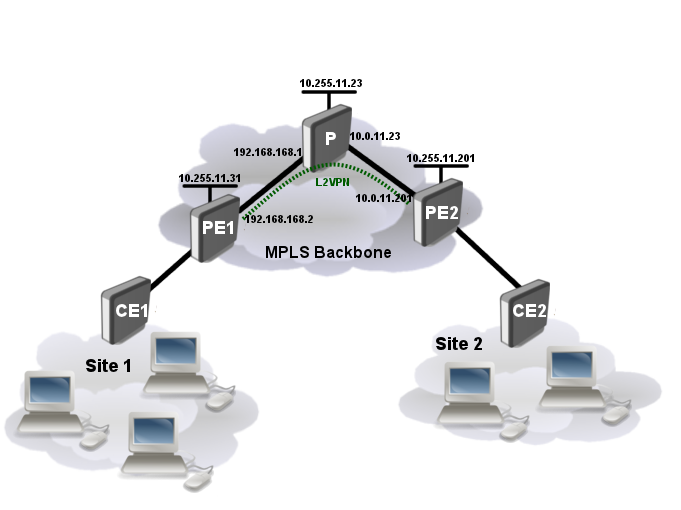Manual:MPLS L2VPN vs Juniper: Difference between revisions
Jump to navigation
Jump to search
| Line 44: | Line 44: | ||
CE2: | CE2: | ||
/ip address add address=192.168.88.2/24 interface=vlan1 | /ip address add address=192.168.88.2/24 interface=vlan1 | ||
| Line 88: | Line 89: | ||
add interface=ether2 | add interface=ether2 | ||
</pre> | </pre> | ||
'''PE2''' (JunOS): | '''PE2''' (JunOS): | ||
Revision as of 15:42, 19 April 2012
Summary
This article describes the basic setup of Point-to-Point L2VPN with Juniper J-series routers.
Configuration
Consider network setup as ilustrated below:
We will be setting up the layer 2 connection between the CE and PE routers as well as the MPLS and L2VPN between PE routers. The layer 2 link between the CE and PE routers will be an Ethernet VLAN circuit.
Set up VLANs
CE1 and CE2 routers:
/interface vlan add vlan-id=600 name=vlan1 disabled=no interface=ether1
PE1 (RouterOS):
No configuration currently is needed, later we will bridge VPLS tunnel.
PE2 (JunOS):
interfaces {
fe-0/0/1 {
vlan-tagging;
encapsulation vlan-ccc;
unit 1 {
encapsulation vlan-ccc;
vlan-id 600;
}
}
}
Set up IP connection, OSPF and LDP
CE1:
/ip address add address=192.168.88.1/24 interface=vlan1
CE2:
/ip address add address=192.168.88.2/24 interface=vlan1
PE1 (RouterOS):
/interface bridge add name=loopback /ip address add address=192.168.168.2/24 interface=ether3 add address=10.255.11.31/32 interface=loopback /routing ospf network add area=backbone disabled=no network=192.168.168.0/24 add area=backbone disabled=no network=10.255.11.31/32 /mpls ldp set enabled=yes lsr-id=10.255.11.31 transport-address=10.255.11.31 /mpls ldp interface add interface=ether3
P (RouterOS):
/interface bridge add name=loopback /ip address add address=10.0.11.23/24 interface=ether1 add address=192.168.168.1/24 interface=ether2 add address=10.255.11.23/32 interface=loopback /routing ospf network add area=backbone disabled=no network=10.0.11.0/24 add area=backbone disabled=no network=192.168.168.0/24 add area=backbone disabled=no network=10.255.11.23/32 /mpls ldp set enabled=yes lsr-id=10.255.11.23 transport-address=10.255.11.23 /mpls ldp interface add interface=ether1 add interface=ether2
PE2 (JunOS):
interfaces {
fe-0/0/0 {
unit 0 {
family inet {
address 10.0.11.201/24;
}
family mpls;
}
}
lo0 {
unit 0 {
family inet {
address 10.255.11.201/32;
}
}
}
}
protocols {
mpls {
interface fe-0/0/0.0;
interface lo0.0;
}
ospf {
export [ export-connected originate ];
area 0.0.0.0 {
interface fe-0/0/0.0;
interface lo0.0 {
passive;
}
}
}
ldp {
egress-policy connected-only;
transport-address 10.255.11.201;
interface all;
}
}
Finally we need to define policy options to advertise label binding for Loopback prefix:
policy-options {
prefix-list loopback-prefix {
10.255.11.201/32;
}
policy-statement connected-only {
from {
prefix-list loopback-prefix;
}
then accept;
}
}
Set up L2VPN
PE1 (RouterOS):
/interface vpls
add cisco-style=yes cisco-style-id=5 name=junos-l2circuit pw-type=tagged-ethernet \
remote-peer=10.255.11.201
/interface bridge add name=vpn
/interface bridge port
add interface=ether5 bridge=vpn
add interface=junos-l2circuit bridge=vpn
PE2 (JunOS):
protocol {
l2circuit {
neighbor 10.255.11.31 {
interface fe-0/0/1.1 {
virtual-circuit-id 5;
}
}
}
}
Verify Operation
PE1:
PE2:
